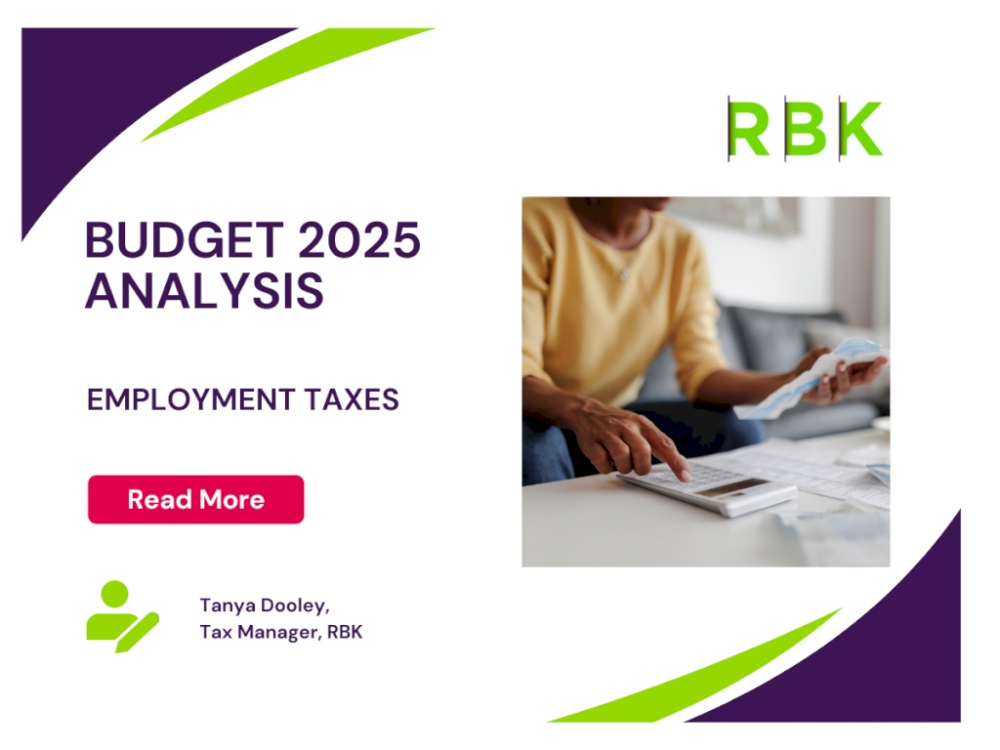The Minister has stated that two of his priorities in Budget 2025 are businesses and workers. One of the biggest challenges currently facing businesses is staffing. According to the CSO, unemployment in the Irish economy fell to 4.3% in August. The labour market is exceptionally tight and this creates a challenge for Irish businesses in being able to attract and retain staff.
Any measures implemented to assist businesses with attracting and retaining talent in Ireland will be welcome. The mantra over the last number of years has been to help the squeezed middle and we certainly expect that the Minister will seek to continue this trend in Budget 2025. The Minister has committed that income tax reductions will be a “core part” of Budget 2025. We have set out below what we would like to see in Budget 2025:
Income Tax/USC
Over the last number of budgets we have seen the Minister for Finance reducing the rate of USC and widening the USC bands. USC is a particularly unpopular tax, introduced when the economy collapsed and associated in the public’s mind with austerity. Whilst highly unlikely that the Minister will have the capacity to eliminate the USC, significant reductions and a path to easing the burden imposed on workers by USC would play well.
As regards income tax, it is widely expected that the Minister will increase the income tax standard rate cut-off point. It is important to note however that with wage inflation and cost of living pressures simply increasing the standard rate cut-off point doesn’t represent a real ‘saving’. It is simply an adjustment for inflation. We would welcome a commitment by the Minister to index link the standard rate cut-off point for inflation into the future.
In the context of an election budget, income tax/USC and the “visibility” of what it means in taxpayers’ payslips is very important. In particular when one considers that workers will feel the “pinch” of additional PRSI measures introduced in Budget 2024 from 1 October (see below), we fully expect that the Minister will want to ensure that taxpayers feel better off after the budget than before it!
PRSI
It is accepted that Ireland’s social security system will face funding challenges in the future due to our aging population. Budget 2024 introduced an increase of 0.1% will be effective from October 2024 followed by a further 0.1% in October 2025, gradually rising to 0.2% by October 2028. Whilst these increases are small and gradual, approx. 90c per week for the average employee they are needed to address the long term funding challenges facing the Social Insurance Fund.
It is however somewhat ironic that at the same time the Minister will be announcing income tax reductions, last year’s increase in PRSI will be kicking in. Whilst the Minister may seek to distinguish PRSI from taxation, for many taxpayers they amount to the same thing.
The current personal tax system is too complicated and convoluted. A real commitment by the Minister to reform and simplify the personal tax system along with a timeline for the implementation of same is well overdue.
Split Year Relief
Split Year relief applies to persons moving to and from Ireland during the course of the tax year and is relief from income tax aimed at income earned outside of the State by those individuals before their arrival or after their departure from Ireland. The relief applies to employment income only and allows an employee to claim full tax credits and bands for the year.
In practice, relief was often claimed when submitting the tax return following the year in which the employee relocates. In many instances it was only when looking at their tax filing after the tax year that taxpayers had the opportunity to consider the potential application of the relief.
Over the last year, there has been a marked change in Revenue’s approach with Revenue insisting that a claim for split year relief must be made in the year of the move. This has been raised with Revenue by tax practitioners and the Taxation Institute. We would encourage the Minister to adopt a pragmatic approach to this important relief and to simply amend the legislation to allow a claim for split year relief to be made with the tax return for the year of assessment to which the claim relates.
Special Assignee Relief Programme (SARP)
SARP relief is currently available to certain new arrivals in Ireland until 31 December 2025 with the minimum income limit for new entrants now €100,000. The programme was designed to encourage employers to relocate their top talent to Ireland and provides tax relief for these employees for 5 years. The relief is very important in helping to attract key talent to Ireland. It is worth noting that other jurisdictions competing for foreign direct investment (FDI) have somewhat similar provisions. Increasingly in attracting FDI, decision makers are considering personal taxes and are not just focused on the rate of corporation tax.
We would encourage the Minister to extend SARP in Budget 2025. Ireland needs to remain competitive in attracting FDI and talent.
Over the next few weeks in the lead up to Budget 2025 #RBKtax will look at potential tax measures that the Government could consider and provide insights into Budget 2025 .
Budget Briefing Hybrid Event
RBK will be holding its annual Breakfast Budget Briefing as a hybrid event in person at the Athlone Springs Hotel in Athlone and streaming live online on Wednesday, 2 nd October. Mike Scanlan, Tax Director, RBK will be analysing the tax measures announced in Budget 2025 and David McNamara, Chief Economist with AIB will look at the economic outlook.
Registration Options:
Contact Us
For more advice and support or to discuss employment taxes, please contact a member of the RBK Tax Team:
Tanya Dooley - Tax Manager - (01) 644 0100


